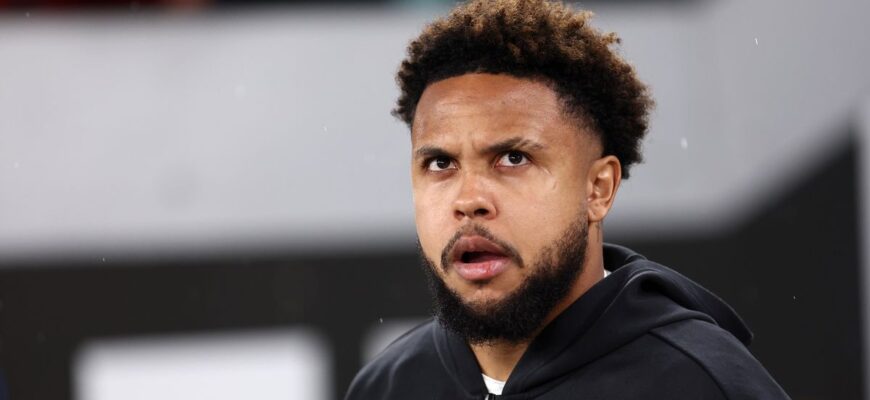In the world of professional football, triumphs are often celebrated with unbridled passion, and defeats met with solemn reflection. Yet, beneath the veneer of sporting spectacle, a darker, far more insidious opponent persists: racial abuse. The recent incident involving United States men`s national team and Juventus midfielder Weston McKennie serves as a stark, regrettable reminder that this battle is far from over.
The Post-Match Abhorrence
Following Juventus`s 2-0 victory against Parma, an incident unfolded that overshadowed any sporting achievement. While McKennie, a dynamic presence for both club and country, was engaging in a post-match training session with teammates, he became the target of racial abuse. This wasn`t a heat-of-the-moment outburst during a tense play; it was an act perpetrated when the competitive fervor had supposedly subsided, highlighting a deeply ingrained prejudice that seeps beyond the ninety minutes of play.
Juventus, McKennie’s club, swiftly acknowledged the incident, albeit often through carefully worded statements. These official condemnations, while necessary, frequently leave one wondering about the tangible, long-term impact on both the perpetrators and the system that allows such incidents to recur. It`s a familiar script: incident, condemnation, investigation, and then, often, a waiting game until the next disheartening headline.
A Disturbing Pattern, Not an Anomaly
For McKennie, this is not an isolated event. Only last year, the midfielder was allegedly subjected to racist chants from Lazio fans during a Coppa Italia match. Reports then indicated that fans made abhorrent monkey sounds as he walked off the pitch after a late substitution. The recurrence suggests not just individual acts of bigotry but a systemic issue that continues to find footholds within football`s passionate, sometimes volatile, fanbase.
Nor is McKennie alone in this ordeal. Just a week prior, a Liverpool fan faced arrest for racially abusing Bournemouth`s Antoine Semenyo during a Premier League fixture. These are not isolated, geographically disparate occurrences but rather threads in a depressingly consistent tapestry of hate that stretches across top-tier leagues. It`s almost as if the beautiful game has a persistent, unwelcome shadow, following it from stadium to stadium, league to league.
The Unseen Scars: Beyond the Public Eye
While clubs issue statements and authorities launch investigations, the toll on the players themselves often goes unexamined in the public discourse. Imagine dedicating your life to excellence, enduring the physical demands of elite sport, only to face dehumanization from the very stands that should celebrate your talent. The psychological burden of racial abuse can be immense, impacting mental well-being, focus, and even passion for the game. For all the talk of “toughness” required in professional sport, no athlete should have to develop a thick skin against racism.
“Football has often been dubbed a mirror of society. If that`s truly the case, then the reflection of racial abuse points to a deeply troubling societal illness that we, as a collective, are struggling to cure.”
The Road Ahead: More Than Just Condemnations
The football world has certainly made strides in acknowledging and combating racism, with campaigns like “Kick It Out” and “No Room For Racism” gaining traction. Yet, the continued occurrence of these incidents underscores a critical question: Are these efforts truly effective, or are they merely scratching the surface?
Effective change requires a multi-pronged approach:
- Stricter Penalties: Fines and stadium bans for individuals need to be rigorously enforced and consistently applied across all leagues. Clubs whose fans are repeat offenders should also face more severe sanctions.
- Education and Awareness: Proactive, continuous educational programs for fans, particularly younger generations, are vital to foster an inclusive culture.
- Player Support: Robust mental health and support systems must be readily available for players who experience abuse.
- Technological Solutions: Utilizing CCTV, AI, and social media monitoring tools to identify perpetrators swiftly.
- Collective Responsibility: Fans themselves must take a stand, calling out and reporting racist behavior from fellow supporters, making it clear that such actions are unwelcome and unacceptable.
Weston McKennie, Antoine Semenyo, and countless others are not just footballers; they are individuals contributing immensely to the global spectacle. Their talent deserves admiration, their dedication respect, and their dignity protection. Until the day racial abuse is truly eradicated from the terraces and training grounds, the beautiful game will remain tarnished, and the fight for true inclusivity will persist, one stern statement, one investigation, and one deeply painful incident at a time.









